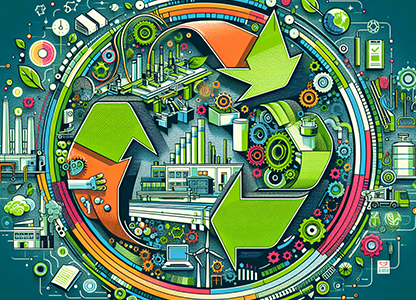Is Bioplastic the Key to Green Manufacturing?

Sustainable Materials: The Future of Eco-friendly Manufacturing
In product development, where the effects of climate change and environmental degradation are becoming more apparent, the need for sustainable manufacturing practices has never been greater. As businesses and consumers become more conscious of their impact on the planet, the demand for eco-friendly products and materials is on the rise. This has led to the development and application of sustainable material alternatives such as bioplastics, recycled metals, mycelium, and bamboo. These materials not only reduce environmental impact but also offer a range of benefits for businesses and consumers alike.
Bioplastics: A Greener Alternative
Bioplastics are derived from renewable sources such as corn, sugarcane, or potatoes, making them a viable alternative to traditional plastics derived from fossil fuels. Unlike conventional plastics, bioplastics are biodegradable and compostable, reducing their environmental footprint. They can be used in a variety of applications, from packaging materials to automotive components.
One company that has embraced the use of bioplastics is Volvo. In their whitepaper on sustainable plastics, they highlight their commitment to finding innovative ways to reduce the environmental impact of their vehicles. Volvo aims to use 25% recycled plastics in every new car they produce by 2025, with a focus on increasing the use of sustainable bioplastics. By incorporating bioplastics into their manufacturing process, Volvo is contributing to a greener future for the automotive industry.
Recycled Metals: Closing the Loop
The production of metals can be resource-intensive and environmentally damaging. However, the use of recycled metals can significantly reduce the need for new extraction and processing. By recycling metals such as aluminum, steel, and copper, we can conserve energy, reduce greenhouse gas emissions, and minimize waste.
Many businesses are recognizing the value of using recycled metals in their products. Companies like Patagonia, a leader in sustainable outdoor apparel, have made significant strides in incorporating recycled metals into their product lines. They use recycled aluminum for their water bottles and recycled nylon for their backpacks, reducing their reliance on virgin materials and minimizing their environmental impact.
Bamboo: Nature's Wonder Material
Bamboo is a highly sustainable and versatile material that is gaining popularity in various industries. It is known for its rapid growth, low water requirement, and minimal need for pesticides or fertilizers. As a renewable resource, bamboo can be harvested without causing deforestation and can replace traditional wood in many applications.
In the construction industry, bamboo is increasingly being used as a sustainable alternative to timber. Its strength, durability, and flexibility make it an excellent choice for flooring, furniture, and even structural elements. Moreover, bamboo can also be used in the production of textiles, providing a sustainable alternative to cotton or synthetic fibers.
The Benefits for Businesses and Consumers
The use of sustainable materials offers numerous benefits for both businesses and consumers. From a business perspective, incorporating eco-friendly materials into products can enhance brand reputation, attract environmentally conscious consumers, and differentiate them from competitors. Additionally, the adoption of sustainable materials can lead to cost savings in the long run as companies reduce their reliance on scarce resources and mitigate environmental risks.
For consumers, sustainable materials provide peace of mind, knowing that their purchasing choices are contributing to a healthier planet. Eco-friendly products made from sustainable materials often have a lower carbon footprint, reducing greenhouse gas emissions and preserving natural resources. Additionally, the use of biodegradable and compostable materials ensures that products have a minimal environmental impact throughout their lifecycle.
Conclusion
The future of manufacturing lies in sustainable materials. The development and application of bioplastics, recycled metals, mycelium, and bamboo offer a greener alternative to traditional manufacturing practices. By reducing environmental impact and promoting resource conservation, businesses can contribute to a more sustainable future. Through the example of Volvo's commitment to sustainable plastics, we can see how companies are embracing these materials and inspiring change in their respective industries. As consumers, we have the power to support businesses that prioritize sustainable materials, fostering a more environmentally conscious and responsible economy.

Discover related Insights
Stay up to date with our latest articles.




